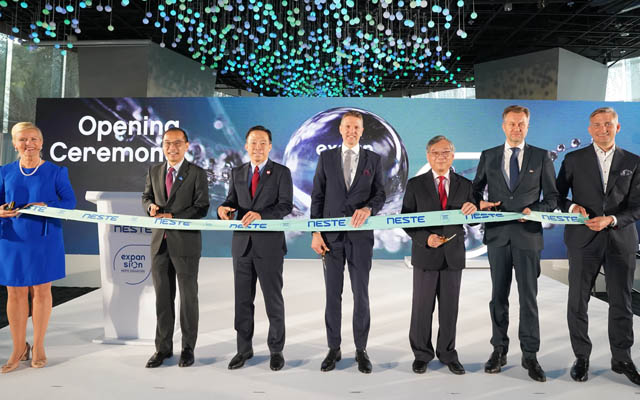Neste celebrated the opening of its Singapore Expansion project on May 17, which was successfully completed around mid-April this year.
The 1.6 billion euros (US$1.7 billion) start-up of the refinery expansion was first announced in December 2018 by Neste on additional renewable products production capacity in Singapore.

The project doubles Neste’s production capacity in Singapore and brings the refinery’s total capacity to 2.6 million tons annually of which up to one million tons can be sustainable aviation fuel (SAF).
In addition to increased production capacity, the enhanced raw material pre-treatment capacity onsite increases Neste’s capability to process more challenging waste and residue raw materials.
“The completion of the construction of the refinery is a remarkable achievement given the complexity of the project and as it was carried out during a global pandemic,” said Matti Lehmus, president and CEO of Neste.
He added: “Singapore has world-class logistics connectivity enabling efficient transportation of the renewable raw materials as well as final products globally. Also, its world-class education supports the availability of future talents to be a part of our production and commercial operations, as well as to enhance our R&D in our recently established Innovation Centre.”
Committed to supporting the aviation industry globally in achieving the goal of net-zero emissions by 2050, Neste has also established an integrated SAF supply chain to Singapore Changi Airport to make its product available to an increasing number of regional and international airlines.
The neat SAF is produced at Neste’s refinery, then blended together with conventional fossil jet fuel and certified to meet jet fuel specifications before delivery to customers at Changi Airport.
Neste is also developing a global network of airports where it has the capability to supply SAF directly into aircraft – this is to support its aviation customers across the globe in achieving their climate targets by reducing their emissions with SAF.
Singapore’s Changi airport extends this network of airports, which includes San Francisco (SFO) and Los Angeles (LAX) in the US, Amsterdam (AMS) in the Netherlands, and Helsinki Airport (HEL) in Finland.




















